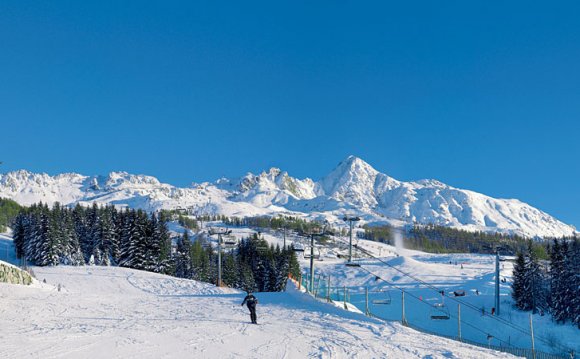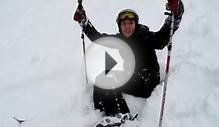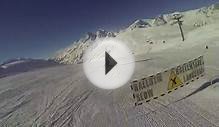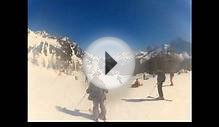
Chamonix, France, was the site of the first Winter Olympic Games, held in 1924. It’s tucked in a steep-walled valley, near the exact junction of France, Italy and Switzerland, in a setting that provides stunning views and dangerous, serpentine runs. In the shadow of Mont Blanc, Europe’s highest mountain (15, 531 ft.), the skiing at Chamonix-Mont-Blanc is some of the most rugged in Europe.
Only at Chamonix-Mont-Blanc
One of the resort’s most popular runs, and one of Europe’s longest trails, is the Vallée Blanche, accessed from the top of the L’Aiguille Du Midi cable car and winding 12 miles down to the Mer De Glace (Sea of Ice.) While this relaxing run is a favorite among alpine skiers of all levels, snowboarders often avoid it due to many flat stretches that demand they unstrap their boards and hike on foot.
Best-kept Secret
There are 145 trails that form almost 90 miles of skiable landscape spread over 13 different ski areas. However, off-trail slopes draw the adventurous to Chamonix. More than 30, 000 skiable acres constitute the resort’s extreme expert-only terrain.
Where to Sleep
Referred to by locals as “satellite villages, ” Les Praz, Les Bossons, Les Moussoux, Argentière and Les Pélérins surround Chamonix proper and are teeming with bed and breakfasts, hostels, campsites, chalets (both catered and non-catered), private residences and hotels.
If you’d like to stay within the town limits, try the Chalet Chantel on Route Des Pêcles, a 3-minute walk from Chamonix. The location is close enough to enjoy the nightlife, yet provides a quiet, pastoral hideaway. Large grounds provide uninterrupted views of the Mont Blanc Range. Shuttles to the airports can be arranged, as well as discount lift tickets and private terrain guides. While pricing can vary depending on season and holidays, promotions and special packages can significantly lower your lift-ticket costs, especially if you’re vacationing with children, who often ski for free. Click here for a full list of accommodations in Chamonix.
Where to Eat
With skiing as demanding and exhausting as that offered at Chamonix, it’s no wonder that après-ski is also expertly celebrated. The town is busiest just after the lifts close, when tired skiers and snowboarders, pints in hand, find comfort under the heat lamps in the main square. For dinner, try the Jekyll & Hyde Bar & Brasserie. A favorite among locals and tourists, the Jekyll is known for its innovative international cuisine: gourmet burgers, falafel, risotto and curry dishes are all listed on the dinner menu. La Petite Kitchen is located in the heart of Chamonix, serving modern European cuisine for dinner and café food for breakfast and lunch.
Where to Shop
Shopping here is reserved for those who love to purchase 2 types of items: food and outdoor gear (the perfect combination for hungry skiers). Browse the streets of Chamonix for warm jackets and sharp skis. Buy a freshly baked baguette at Au Pain d’Antan and pair it with cheese and wine purchased Super U, the one-stop grocery store that all tourists need.
For the Non-skier
Non-skiers can enjoy Chamonix’s rugged beauty by snowmobiling, ice-climbing, hiking, snowshoeing, sleigh-riding and dog-sledding. Experience mountain views (without worrying about how to ski down) on one of many cable car excursions. From the top of Le Brévent (8, 153 ft.) there are stunning views of Mont Blanc and the Aguilles de Chamonix. Roundtrip takes approximately 2 hours and costs 23 Euros.
Biggest Bang for Your Buck
While travel between the terrains at Chamonix can be challenging, those with cars can easily navigate to nearby Argentière, Les Houches or Courmayeur, 3 venues that offer skiing and snowboarding more easily navigated by beginners and intermediates. For access to all the surrounding areas, purchase the Ski Pass Mont Blanc, costing €50 for a single day, €250for a 6-day pass and €1, 300 for the season.
Travel Channel Tip
Hire a guide. Chamonix is known for its steep, challenging terrain. Jon Krakauer, mountaineer and author of "Into Thin Air, " called Chamonix the "death-sport capital of the world." For those seeking elevated adventure, a guide can help you navigate through terrain that is often steep and ungroomed, riddled with cornices and crevasses.
YOU MIGHT ALSO LIKE












